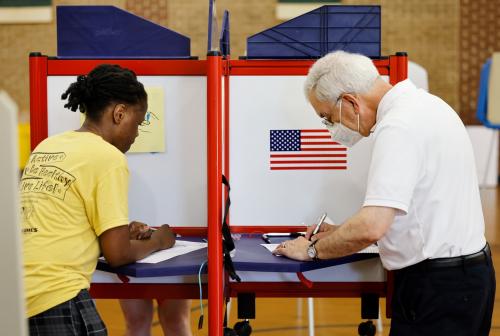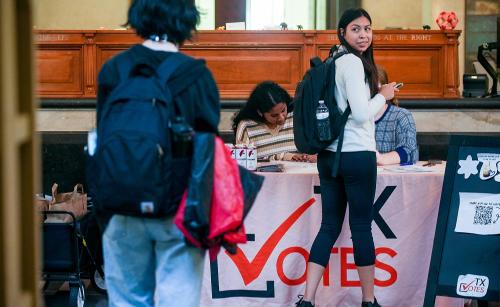This week, I will profile India’s three most important states. Maharashtra, Tamil Nadu and Gujarat are as different as New York, Texas or California. In fact, since each state has its own official language, the better comparisons may be with England, France and Germany. Their chief ministers are no more alike than Andrew Cuomo, Rick Perry and Jerry Brown—or Nicholas Sarkozy, David Cameron, and Angela Merkel.
Friends and “frienemies”: Maharashtra is India’s richest and most important state. With over 100 million people and the highest GDP per capita of a major state, it spans the full range of India’s industrial, rural, and cultural diversity.
Moreover, its capital, Mumbai, is India’s largest, most cosmopolitan, and most complicated city—an all-in-one financial, manufacturing, and entertainment capital. Scores of Indian companies headquarter here. Mumbai is New York, Los Angeles, and Miami rolled into one. Only New Delhi comes close in importance.
Prithviraj Chavan, a Berkeley-trained engineer, is Maharashtra’s Chief Minister. He is the ultimate manager, appointed his post a year ago by Sonia Gandhi’s Congress Party. In New Delhi, he successfully ran key national ministries such as atomic affairs, personnel, scientific affairs, and parliamentary affairs.
Now Chavan is back in Mumbai. He must wake up each morning wondering what he did to deserve this job. For all of his hometown’s riches and charms, it faces immense challenges: insufficient roads and sewers, and an insatiable thirst for water and power. Those deficits are compounded daily by a fast-growing population. Mumbai has about 12 million people in the city itself, and about 30 million in the metro region.
While Chavan is well-regarded by business leaders and academics, he inherited a nearly impossible job. In the capital city alone, he is a technocrat fighting a war against not one, but two political machines. That two front war will witness a critical battle tomorrow: the Mumbai Municipal elections.
The first front is with Mumbai’s Municipal Authority, currently run by the Shiv Sena party. Chavan’s Maharashtra state headquarters are less than two miles from the Mumbai Municipal Authority, both a short walk to the iconic Gateway to India. But the two governments might as well be on different ends of the country. In fact, being farther apart might be better for the city and state.
Mumbai city and Maharashtra state battle over education, infrastructure, and public housing—the last item being crucial in a city with over 8 million living in slums. The Municipal Authority is controlled by the party boss Bal Thackeray, and his son Uddhav, who have ruled the city for two decades. They built their machine to fight the influx of non-Maharashtrans who flooded into the city’s slums. “Hordes of people are coming in,” Bal Thackeray recently told The Hindu. “Who will provide them amenities?”
Shiv Sena and their allies in the BJP have built their party on explicit appeals to the “Hindu civilization”—similar to the emphasis on “Western Civilization” or “Judeo-Christian values” at the center of American conservatism. The Shiv Sena also consistently argues against New Delhi, and argues for local control in decision-making, administration, and taxation.
Under Shiv Sena, local rule has been a mixed bag in Mumbai. It’s most recent accomplishment is the new Sea Link bridge that connects the northern suburbs to the financial and business districts, cutting a half hour of travel. On the other hand, Sea Link (and many other) projects have been notorious in failing to meet deadlines and failing to match their projected budgets. Government contracts regularly go to friends of the Shiv Sena.
The winning bids are preposterously low—so low that they could not possibly meet the specifications appropriate for the road or bridge in question. That leads most outside observers to suspect a bribe was also paid. So when the projects are then implemented, they come in way over budget. The city of Mumbai ultimately has to come back to Maharashtra or to Delhi to bail them out.
So Chief Minister Chavan is trying to beat the Shiv Sena based on a platform of cleaning up corruption. He is promising better administrative performance, especially on infrastructure. He also is targeting the non-Maharashtrans who have moved into the city slums. His big promise: greater and faster access to public housing.
The population in Dharavi—the place made famous by Slumdog Millionaire—are the emerging swing voters of Mumbai. Like the ghettos of New York in the early 1900s, many Dharavi dwellers have moved here to live and work—something my 9 year old-daughter could glimpse in a recent visit. Dharavi residents are not resigned to their fates. They are upwardly mobile. They wait for permanent housing, and hope for clean water, sanitation, and electricity. In appealing to the slum-masses, Chavan and his party argue that the state is a more capable and inclusive administrator than is the corrupt Municipal Authority.
If politics were only about wrestling with Mumbai city, Chavan might be able to muscle through. Instead, he also wages a battle with his own coalition partners in the state legislature. Chavan’s Congress Party controls 82 seats (21%), and forms a coalition with the break-away National Congress Party (NCP), which controls 62 seats (16%), as well as a number of smaller parties. Moreover, the Congress Party also needs NCP votes to form a government in Delhi. Though the NCP provides only 9 out of 262 votes in the national governing coalition, that is a critical block.
The NCP’s boss is Sharad Pawar—a sugar magnate from Pune, and a former Chief Minister of the state. Pawar is happy to wield the enormous power that his NCP votes bring. In Delhi, he traded in his 9 votes in parliament so he could hold the post of Agriculture minister. In that job, he has gone slow on liberalization of farming—much to the chagrin of domestic and foreign investors in Mumbai who want to develop India’s agricultural riches.
In Maharashtra, Sharad Pawar also wields power. His nephew, Ajit Pawar, is the Deputy Chief Minister. His portfolio includes responsibility for finances, giving him an effective veto over anything Chavan wants to do. Like his uncle, Ajit has been deeply involved in agricultural issues. So while Chavan might fight to reform the power or water sector to help in the development of urban areas, the Pawar family will fight to make sure that agricultural interests are not ignored. In a state where about the half the people are still rural, that means steering resources to the countryside.
Given that tense alliance, every state or national election provides the Congress and NCP an opportunity to reset the balance. In advance of municipal elections in Mumbai, for instance, Sharad Pawar has enjoyed reminding voters that Chavan “has not been elected directly by the people.” Pawar taunts Chavan regularly, bragging that the NCP does not “look North [to Delhi] for directives.”
“The Congress Party is destined to fight an endless battle to defeat its friends,” explained the great columnist and editor, MJ Akbar (and a non-resident Brookings fellow). The fighting doesn’t end, since relative weight in state and national voting bodies is critical for how far any government leader can move an issue—whether it is reform of power, or water, or roads, or housing, or education.
How Chavan navigates these friends and ‘frien-emies’ will go a long way in determining the future of India’s most important state and city. A strong Congress Party showing on Thursday would indicate that good governance may be a winning message with a rising working class, in Dharavi and beyond.
Once the municipal elections are over, however, Chavan’s attention will turn to national elections, which could happen as early as next year. And Chavan will naturally be pulled away from Mumbai, and will have to focus on the poorer, more agricultural parts of the state.
So if Chavan is going to follow through on his promises to Mumbai, he will have to empower—or more accurately, liberate—local authorities to act on his promises. That will mean doing something that few Chief Ministers have done in the past—building up real capacity at the city and neighborhood level.
If he doesn’t do that, then Indian politics may really resemble cricket, where the batters stay the same, but just keep changing places.



Commentary
Maximum Election: Technocrat Tackles Machines
February 15, 2012